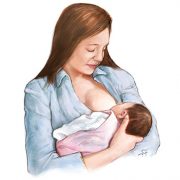New study suggests that breastfeeding may help prevent cognitive decline
Women who had breastfed their babies performed better on cognitive tests after the age of 50 compared to women who had not breastfed.
A new study led by researchers at UCLA Health has found that women over the age of 50 who had breastfed their babies performed better on cognitive tests compared to women who had never breastfed. The findings, published in Evolution, Medicine, and Public Health, suggest that breastfeeding may have a positive impact on postmenopausal women’s cognitive performance and could have long-term benefits for the mother’s brain.
Cognitive health is critical for wellbeing in aging adults. Yet, when cognition becomes impaired after the age of 50, it can be a strong predictor of Alzheimer’s Disease (AD), the leading form of dementia and cause of disability among the elderly – with women comprising nearly two-thirds of Americans living with the disease.
Many studies also show that phases of a woman’s reproductive life-history, such as menstruation, pregnancy, breastfeeding and menopause can be linked to a higher or lower risk for developing various health conditions like depression or breast cancer, yet few studies have examined breastfeeding and its impact on women’s long-term cognition. Of those that have, there has been conflicting evidence as to whether breastfeeding might be linked to better cognitive performance or Alzheimer’s risk among post-menopausal women.
Release date: 22 October 2021
Source: University of California – Los Angeles Health Sciences









